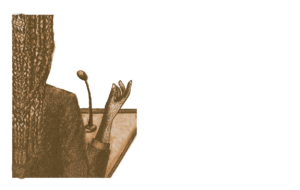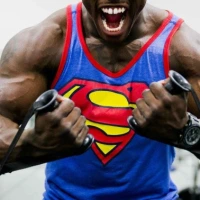In 2013, personal fitness trainer Drew Manning wrote the book Fit2Fat2Fit. Manning was an absolute wrecking ball of a physical specimen. As a fitness pro though, he found he was losing left and right the clients in the most desperate need of his help. Over and over he heard “you don’t know what it’s like to be fat, you don’t understand how hard it is,” and they’d just stop coming.
Manning came up with an idea that took “thinking outside the box” to another level. He spent six months away from the gym eating poorly and amassed seventy-five pounds in a quest to gain insight and empathy into the struggles of his clients. Then he spent another six months sculpting himself back into his original hulking form.
As a person who has battled with my weight all my adult life, I was glued to the screen when I first discovered him making the rounds on the talk show circuit. Now that this man had inside knowledge of both worlds, the fat and frustrated and the fanatically fit, I expected he’d be in a position to articulate some unique wisdom that would stand out in the realm of dieting advice.
His big take-away? Being fat really sucks and it’s hard.
Wow. Stop the presses.
His extreme experiment and the resulting notoriety garnered him a t.v. show on the A&E network where other trainers replicate his pound-packing experience and go about getting fit alongside their overweight clients. While eating a bag of Ruffles, I watched an episode online the other night where a trainer named Adonis (yeah, “Adonis”) was working with a school teacher, Alissa. Adonis put on weight so quickly, his doctor ordered an immediate halt to the experiment and put him on blood pressure meds.
When Adonis and Alissa began working out together, he rattled off all the standard trainer jargon. “You gotta’ want it, let’s go, it’s so simple, you gotta’ give it your all…” Alissa just looked into the camera with her head cocked to the side, indicating this was the same stuff she’d heard a hundred times from others who also thought they were helping. Adonis believed he was bringing something different because now, he too knew something of the experience of being fat–for four months. He reminded her that he’d risked his own life and health, and that she owed more to this process given his sacrifice. I thought “wait, wasn’t this whole experiment supposed to be about what knowledge you could bring back to help her? When did this become about you and your big sacrifice?”
That’s what was so unfulfilling about watching the talk show interviews with trainer Drew Manning. I wanted to know what he learned from his trip into the fat world that he could now bring back to help me in my weight struggle, given that I was undoubtedly his intended audience. His interviews only demonstrated he was finally comprehending that what his disappearing clients had been trying to tell him all along, that being fat sucks and is really hard, was true. This wasn’t news to anybody but him. His daring experiment had been reduced to no more than a self-serving attention grabber.
White people, I’m going to give it to you straight now. At every gathering about race I’ve been to, there are always white individuals standing up to tell about their adopted black son, their daughter’s children with her new black husband, the black woman he dated for years in his twenties and almost married, the black neighbors who come to their house and have dinner “just like any other people….” You get the picture. What you don’t see are the black people (and really clued-in whites) in the back of the room rolling their eyes, or politely resisting the desire to do so. We hear white people tell their story of some racially effected encounter they’ve had, some incident that is as commonplace for blacks as rain in April, like they’re Columbus discovering the Bahamian archipelago. We’re left thinking “…….and?”
And what? What did you learn from that experience that you can now bring back to the discussion of race that can help everyone listening see something new too? (Emphasis on new.) What generality did you learn that can help blacks who are listening learn something we didn’t understand before about whites? What did you learn about yourself that blacks can take with us and use as an example when we’re talking with others about race? What did you learn about black people that you didn’t know before and how has that lesson changed how you interact with non-white people? What did you glean from that encounter that you can bring toward aiding in the challenges of disenfranchised people? What useful information are you trying to convey to the other whites in the room, beyond listing the bona fides that have earned your thoughts more gravitas than theirs?
So you have an adopted black son. Great. When you’re telling me about that, I’m looking to hear what you understand differently now as a result of being that child’s mother that can help all black people. That can help all people.
Scenario #1) A black coworker is lamenting how her nephew got snatched up in a wide net stop-and-frisk scenario on the way home from a rap concert Friday night. He’s still in a cell downtown because the family can’t afford bail. White Woman adds to the conversation “you know, my adopted black son was at that concert too. When he got home safe and sound and told me about what happened to a lot of other black kids, I was so worried. So, yeah, I understand.”
Uh, no. All White Woman did was shift the focus to herself to no helpful end, and steal a minute and a half of everyone’s time and energy needed to imagine a real solution to the problem at hand.
Scenario #2) A black coworker is lamenting how her nephew got snatched up in a wide net stop-and-frisk scenario on the way home from a rap concert Friday night. White Woman adds to the conversation “you know, we’ve adopted a black son and he was at that concert too. When I heard on the 11:00 news about the wide sweep arrests police were doing, I sat on pins and needles until my son walked into that front door safely. It occurred to me that when I was raising my first boy, I never had to worry like that. The only variable was race. No mother, black or white, should ever have to feel that kind of terror, and I realized I can’t sit on the sidelines anymore. What can I do to help?”
You see the difference?
No one cares how much you know until they know how much you care.

